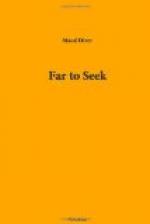Roy, who also ‘belonged’ in a measure, very nearly said so—but again prudence prevailed. “I’m rash enough to disagree with you,” he said placably. “The question of non-interference, of letting ill alone—because one’s afraid or can’t be bothered—isn’t merely a race question; it’s a root question of human character. Some men can’t pass by on the other side. Right or wrong, it simply isn’t arguable. It’s a matter of the individual conscience—the heart——”
“Conscience and heart—if not drastically disciplined by the logically reasoning brain, propagate the majority of troubles that afflict mankind,” quoth Chandranath in the manner of one familiar with platform oratory. “Are you stopping in Jaipur?”
“Yes. At the Residency. Mrs Leigh is Desmond’s sister. Did you know?”
“That is curious. I did not know. Too much heart and conscience there also. Mrs Leigh is thrusting her fingers into complicated issues of which she is lamentably ignorant.”
Roy, taken aback, nearly gave himself away—but not quite. “I gather she acted with Sir Lakshman Singh’s approval,” was all he said.
Chandranath shrugged. “Sir Lakshman is an able but deluded man. His dreams of social reform are obsolete. We of the new school adhere patriotically to social and religious ordinances of the Mother. All we agitate for is political independence.” He unfurled the polysyllables, like a flag; sublimely unaware of having stated a contradiction in terms. “But your Sir Lakshman is of the old-fashioned school—English-mad.”
“And your particular friends—are sane, eh?”
The apostle of Hindu revival pensively twirled an English button of his creditably-cut English coat.
“Yes. We are sane—thanks to more liberalising influences. Coloured dust cannot be thrown in our eyes by bureaucratic conjuring tricks, or imperialistic talk about prestige. To-day it is India’s turn for prestige. ‘Arya for the Aryans’ is the slogan of the rising generation.” He paused, blinked, and added with an ingratiating chuckle: “You will go running away with an impression that I am metamorphosed into red-hot revolutionary. No, thank you! I am intrinsically a man of peace!” With a flourish he jerked out a showy gold watch. “Ah—getting late! Very agreeable exchanging amenities with old schoolfellows. But I have an appointment in the Palace Gardens, at the time they feed the muggers. That is a sight you should see, Mr Sinclair—when the beasts are hungry and have not lately snapped up a washerwoman or an erring wife!”
“I’d rather be excused this evening, thanks,” Roy answered, with a touch of brusqueness. “I confess it wouldn’t appeal to my sense of humour—seeing crocodiles gorge, while women and children starve.”
“That is what they call in a book I once read ‘little ironies of life.’ Good fortune, at least, for the muggers! Better start to sharpen your sense of humour, my friend. It is incomparable asset against the slings and arrows of outrageous contingencies.” This time his chuckle had an undernote of malice; and Roy, considering him thoughtfully—from green turban to patent-leather shoes—felt an acute desire to take him by the scruff of his English coat and dust the Jaipur market-place with the remnant of him.




